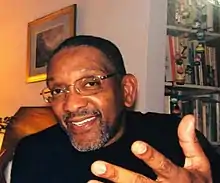Franklyn Harvey
Franklyn Harvey (February 14, 1943 – May 16, 2016) was a Grenadian academic, activist and professional, a founder of the New Jewel Movement and principal author of their manifesto. He had a significant influence on the development of the Caribbean new left throughout the 1960s and 1970s and later, in the animation of hundreds of municipal and community projects all around the world. When the NJM took over the government of Grenada on March 13, 1979, Harvey's contributions to their manifesto began to take concrete form across the island.

Biography
Harvey was born in St. Andrews, Grenada on February 14, 1943. He graduated from Presentation College in St. Georges, Grenada, received a B.Sc. in engineering from the University of London in 1964 and a Masters in Environmental Science from McGill University in 1968.
While studying at McGill for his master's degree in environmental studies, he was part of the CLR James Study Circle and the Caribbean Conference Committee, along with Robert Hill, Alphonso (Alfie) Roberts, Tim Hector, and (now) Canadian Senator Anne Cools – a group which formed the basis of the new Caribbean Left.[1] In 1968 Harvey was one of the key influences behind the C.L.R. James Study Circle and the October 1968 Montreal Black Writers Conference[2][3] Back in Trinidad after graduating from McGill, he began to put CLR James’ theory into practice as, among many other activities, a founding member of the populist based, bottom-up New Beginning Movement in Trinidad[4] and part of the Grenadian leadership of the Movement for Assemblies of the People (MAP), which ultimately became part of the New Jewel Movement (NJM). Harvey, as a founding member, was one of the critical links between Trinidad's New Beginning Movement and the Movement for the Assemblies of the People (MAP), one of the constituent organizations of Grenada’s New Jewel Movement.[5]
Harvey was the primary author of "The Manifesto of the New Jewel Movement",[6] the basic programme of the NJM when it took over the Government of Grenada on March 13, 1979 [7]
His professional working career began as Senior Researcher in Housing & Planning at the Faculty of Engineering, University of the West Indies (UWI) Trinidad from 1968 - 1972, followed by the position of Coordinator of the UN Model Development Project in Trinidad from 1969 to 1971.
Returning to Toronto Canada in 1974, he worked as Programme Manager in the Planning & Development Department of the City of Toronto from 1974 to the mid 1980s, ultimately as its Director. Throughout this period he was involved in many grassroots initiatives as the Editor of Caribbean Dialogue[8] including Caribbean Connection[9] and the Latin American Working Group (LAWG). In 1986 he founded and became the Principal in Participlan, a consulting company which supported consultation and planning in the NGO world – carrying out extensive work with Canadian and international NGOs, including Amnesty International, the Federation of Canadian Municipalities and Oxfam Canada. His community consulting work took him throughout the world (Guyana, the Caribbean, Pakistan, Indonesia, Sri Lanka, and he participated in many regional events which took place in Vietnam, Cambodia, Thailand, Nepal, Philippines). In 1997 he founded Caribbean Self-Reliance International (CASRI), an NGO working with partner organizations in the Caribbean in initiatives resulting in real change in people’s lives and promoting community transformation.
He died in Ottawa, Canada on May 16, 2016.
Publications
- The Rise and Fall of Party Politics in Trinidad & Tobago, February 1974, New Beginning Movement, Toronto
- Editorial: Reality and Perspective, Caribbean Dialogue, Vol.1 No.1, August - September 1975
- The Optimization of concrete beams with reliability constraints, 1968, McGill University, Dissertation Department of Civil Engineering
References
- Austin, David: Fear of a Black Nation, Between the Lines, Toronto, 2013 (pages 32, 74, 78, 79, 87-88, 91, 98, 100)
- Quinn, Kate: Conventional politics or revolution: Black Power and the radical challenge to the Westminster model in the Caribbean, Commonwealth & Comparative Politics, Volume 53, 2015 - Issue 1: Westminster in the Caribbean Revisited
- Quest, Matthew: New_Beginning Movement: Coordinating Council of Revolutionary Alternatives for Trinidad and the Caribbean, Chapter 5 in Ideology, Regionalism, and Society in Caribbean History, Palgrave, 2017, ISBN 978-3-319-61418-2
- Puri, Shalini: The Grenada Revolution in the Caribbean Present - Operation Urgent Memory, Palgrave Macmillan US 2014
- Harewood, Patricia Another World is Possible A review of You Don’t Play With Revolution, the Montreal Lectures of C.L.R. James. AK Press, 2009 David Austin (ed)
- Quinn, Kate: Conventional politics or revolution: Black Power and the radical challenge to the Westminster model in the Caribbean in Commonwealth & Comparative Politics, Volume 53, 2015 - Issue 1: Westminster in the Caribbean Revisited https://dx.doi.org/10.1080/14662043.2014.993145
- Harewood, Patricia: Another World is Possible http://uppingtheanti.org/journal/article/10-another-world-is-possible/
- Gibbings, Wesley: Remembering the 1968 Congress of Black Writers http://www4.guardian.co.tt/life-lead/2018-04-09/remembering-1968-congress-black-writers Trinidad Guardian, April 9, 2018.
- Quest, Matthew: New_Beginning Movement: Coordinating Council of Revolutionary Alternatives for Trinidad and the Caribbean, Chapter 5 in Ideology, Regionalism, and Society in Caribbean History, Palgrave, 2017, ISBN 978-3-319-61418-2
- Quinn
- "Manifesto of the New Jewel Movement manifesto.html".
- Marable, Manning. African & Caribbean Politics: From Kwame Nkrumah to Maurice Bishop, Verso Press. ©1987
- https://www.worldcat.org/title/caribbean-dialogue/oclc/3230440
- https://www.worldcat.org/title/caribbean-connection/oclc/657059190
External links
- Franklyn Harvey’s Obituary/Legacy page
- Pambazuka: A Tribute to Franklyn Harvey
- TT National Workers Union: Franklyn Harvey (b.1943; d. 2016)
- Learning from the Ground Up: Global Perspectives on Social Movements and Knowledge Production, Chapter 11: Vanguards and Masses: Global Lessons from the Grenada Revolution by David Austin
http://www.workersunion.org.tt/where-we-stand/nwu-news/untitledpost-32